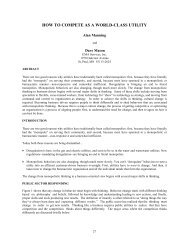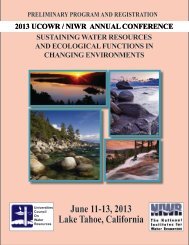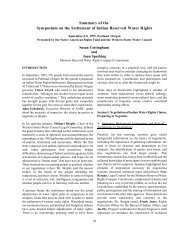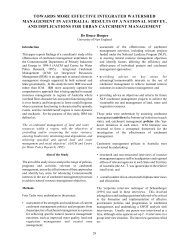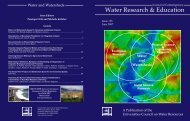70Green <strong>and</strong> Fernández-Bilbaoinfluence these key stakeholders then it will not beable to deliver on the <strong>Water</strong> Framework Directive(Le Quesne <strong>and</strong> Green 2005).Absent from this list <strong>of</strong> key stakeholders are theenvironmental non-governmental organizations.This is because the Environment Agency has acentral commitment to environmental conservation.In particular, the Chief Executive <strong>of</strong> the agency wassuccessively Chief Executive <strong>of</strong> the Royal Societyfor the Protection <strong>of</strong> Birds, the most importantenvironmental non-governmental organization,<strong>and</strong> then <strong>of</strong> English Nature, the government agencywith responsibility for environmental conservation.This leaves other environmental non-governmentalorganizations, such as the World Wildlife Fund,without an obvious ecological niche.In seeking to influence these other stakeholders,the agency will have to recognize the asymmetries<strong>of</strong> interest among the stakeholders. The localauthorities may have little to gain from workingclosely with the agency <strong>and</strong> a lot to lose. Thelocal authorities have multiple objectives <strong>and</strong>constraints with which they must cope, includingthe needs either <strong>of</strong> socio-economic regeneration or<strong>of</strong> accommodating large inflows <strong>of</strong> development.Taking account <strong>of</strong> water management issues willadd to their difficulties <strong>and</strong> will restrict both wheredevelopment can take place <strong>and</strong> the form <strong>of</strong> thatdevelopment.The competent authority will have not onlyto be very successful at influencing the otherstakeholders, but also at co-ordinating the actions<strong>of</strong> those other stakeholders. Key to both tasks is theestablishment <strong>of</strong> some form <strong>of</strong> stakeholder forumfor each catchment; what is at issue is the powerthat would reside in each <strong>of</strong> those fora <strong>and</strong> hencein each stakeholder. Each forum could be simplya sounding board <strong>and</strong> means <strong>of</strong> liaison betweenthe different stakeholders, the EnvironmentAgency’s original proposal for implementing the<strong>Water</strong> Framework Directive (Environment Agency2005). Or, it might make recommendations to thedifferent stakeholders as to the actions each shouldtake as part <strong>of</strong> the program <strong>of</strong> actions necessaryto deliver the objectives <strong>of</strong> the <strong>Water</strong> FrameworkDirective. Finally, it might decide on the riverbasin management plan <strong>and</strong> the program <strong>of</strong> actionnecessary to implement it.Given the lack <strong>of</strong> experience in Engl<strong>and</strong> <strong>of</strong> suchapproaches, it would be useful to allow differentforms to emerge in different catchments, as thelocal stakeholders decide. Within each catchmentforum, there would then also be scope for adoptingdifferent processes; that process has been variouslyframed in quite different ways as “conflictresolution” (Acl<strong>and</strong> 1990, H<strong>and</strong>mer et al. 1991,Priscoli 1996), “consensus building” (Innes 1996),“future search” (Weisbord <strong>and</strong> Jan<strong>of</strong>f 1995), “sociallearning” (Pahl-Wostl 2002, Craps 2003, Ison et al.2004, HarmoniCOP 2005) <strong>and</strong> “learning alliances”(Adank et al. 2006). What is required is an overallsystem for evaluating the relative success <strong>of</strong> eachdifferent forum. In the short run, that evaluationhas to focus upon process rather than outcomes,<strong>and</strong> the key process characteristic is change: thenature <strong>and</strong> extent <strong>of</strong> the changes, particularly in theunderst<strong>and</strong>ings <strong>of</strong> each stakeholder <strong>of</strong> each other(Green et al. 2004).We are further faced with the problem <strong>of</strong>delivering integration through functional linebudgets. Some general source <strong>of</strong> revenue whichcould be used for general purposes to enhance theperformance <strong>of</strong> the catchment would be a usefullubricant here. In the past, the introduction <strong>of</strong>specific charges for abstractions <strong>and</strong> discharges tocover the administrative costs for permitting havebeen rejected when they have been considered aspossible economic instruments (Department <strong>of</strong> theEnvironment, Transport <strong>and</strong> the Regions 1997,2000). Our proposal here is instead for a levy asa source <strong>of</strong> revenue rather than any expectationthat such a levy would have any effect upon l<strong>and</strong><strong>and</strong> water users. A small charge, the simplest formbeing that <strong>of</strong> a property tax, would generate fundswhich could then make it easier to put togetherother funding from the line budgets <strong>of</strong> the differentpublic <strong>and</strong> private stakeholders. Decisions as tothe appropriate spending <strong>of</strong> these funds would bedetermined by the stakeholder fora.ConclusionsIntroducing IWRM requires very differentinstitutional practice than we have seen in the past inEngl<strong>and</strong>. It is a challenge for which the centralizedgovernment tradition <strong>of</strong> Engl<strong>and</strong> has ill-preparedthe people. Indeed, the adoption without discussion<strong>of</strong> the Environment Agency as the competentauthority under the <strong>Water</strong> Framework Directive isUCOWRJOURNAL OF CONTEMPORARY WATER RESEARCH & EDUCATION
Implementing the <strong>Water</strong> Framework Directive71a hang-over from that centralized tradition. If theEnvironment Agency as the competent authority isto be successful, <strong>and</strong> perhaps even survive, it hasto rapidly become exceedingly good at two tasks:1. Influencing the other stakeholders who havethe power or funding to deliver the objectives<strong>of</strong> the <strong>Water</strong> Framework Directive.2. Building <strong>and</strong> sustaining those fora <strong>of</strong>all stakeholders that enable the differentstakeholders to co-ordinate their actions.These, we argue, are the two key criteria forsuccess <strong>of</strong> all competent authorities designatedunder the <strong>Water</strong> Framework Directive. A furthermore general criterion for successful watermanagement institutions is that they have to beboth innovative <strong>and</strong> adaptive.We consider that a forum <strong>of</strong> stakeholders foreach catchment, with responsibility for settingout the program <strong>of</strong> actions necessary to deliverthe objectives <strong>of</strong> the <strong>Water</strong> Framework Directiveis a necessary pre-condition for success. But,given the lack <strong>of</strong> experience in such fora, <strong>and</strong> inthe processes which such a forum should adopt,it is appropriate to experiment with differentapproaches in different catchments, <strong>and</strong> comparethe success <strong>of</strong> each approach.A significant problem in implementing the<strong>Water</strong> Framework Directive is likely to be that <strong>of</strong>trying to do so using functional line budgets. A“catchment conservancy levy” on all l<strong>and</strong> use,which could be used on any action that wouldimprove the ecological <strong>and</strong> economic performance<strong>of</strong> the catchment could be a useful tool in thisregard.Finally, we argue that in a country where l<strong>and</strong>is already being used very intensely, the mostimportant form <strong>of</strong> integration is between l<strong>and</strong> <strong>and</strong>water management. In consequence, it is withinin the Regional Spatial Strategies <strong>and</strong> LocalDevelopment Frameworks that it is essential toembed water management concerns. If to do so itis necessary to sacrifice river basin managementplans, then this would be a desirable sacrifice.Overall, we argue, it is institutional implementationboth in structure <strong>and</strong> in process that is the criticalelement in delivering IWRM.AcknowledgementsThe research undertaken for this paper was partlyfunded by the British Academy.Author Bios <strong>and</strong> Contact InformationCOLIN GREEN is Pr<strong>of</strong>essor <strong>of</strong> <strong>Water</strong> Economics at MiddlesexUniversity. He has acted as advisor to the WorldCommission on Dams; the Global <strong>Water</strong> Partnership/World Meteorological Office program on IntegratedFlood Management, <strong>and</strong> was lead author on the UKguidelines on the economic appraisal <strong>of</strong> flood <strong>and</strong> coastaldefense schemes. He also advised, among others, theWorld Bank <strong>and</strong> UNEP; in the UK, the EnvironmentAgency, OFWAT, RSPB, English Nature, the NationalAudit Office, <strong>and</strong> Defra. Recently, he was responsiblefor the socio-economic appraisal <strong>of</strong> the Strategic UrbanDrainage Plan for Buenos Aires. He has also workedin China, South Africa, Egypt, Bangladesh, Portugal,France, <strong>and</strong> Hungary <strong>and</strong> has been involved in the European<strong>Research</strong> Programs: EUROFLOOD1, EURO-FLOOD2, HARMONICOP, FLOODSITE, SWITCH<strong>and</strong> SPICOSA. His H<strong>and</strong>book <strong>of</strong> <strong>Water</strong> Economicswas published in 2003 by John Wiley <strong>and</strong> in a Chinesetranslation by <strong>Water</strong>Power Press in 2004. He was electedto the International Academy <strong>of</strong> <strong>Water</strong> in 2000. Hecan be contacted at the Flood Hazard <strong>Research</strong> Centre,Middlesex University, Queensway, Enfield, EN3 4SA,UK, email c.green@mdx.ac.uk.AMALIA FERNÁNDEZ-BILBAO is an environmental scientistwith a background in flood risk management <strong>and</strong> socialresearch. She graduated with a BSc in EnvironmentalScience <strong>and</strong> Geography, Environment <strong>and</strong> Sustainability<strong>and</strong> also has an MSc in Sustainable EnvironmentalManagement (<strong>Water</strong> specialism) from MiddlesexUniversity. She has worked in several UK <strong>and</strong> Europeanprojects including FLOODSITE, during her three yearsat the Flood Hazard <strong>Research</strong> Centre (MiddlesexUniversity). She is currently working as environmentalconsultant for Collingwood Environmental Planning.She can be contacted at Collingwood EnvironmentalPlanning, 4.2.3 The Leathermarket, Weston Street,London SE1 3ER, UK, email a.fern<strong>and</strong>ez@cep.co.uk.ReferencesAcl<strong>and</strong>, A. F. 1990. A Sudden Outbreak <strong>of</strong> CommonSense: Managing Confl ict Through Mediation.Hutchinson, London.Adank, M., P. Bury, J. Butterworth, D. Casella, M.Morris, <strong>and</strong> J. Verhagen. 2006. Report on LearningAlliance Training. IRC, Delft. Online at http://www.eeb.org/.JOURNAL OF CONTEMPORARY WATER RESEARCH & EDUCATIONUCOWR
- Page 3:
Journal of ContemporaryWater Resear
- Page 6 and 7:
2Bruce Hooperinstitutional, and tem
- Page 11 and 12:
IWRM: Governance, Best Practice, an
- Page 13 and 14:
IWRM: Defi nitions and Conceptual M
- Page 15 and 16:
IWRM: Defi nitions and Conceptual M
- Page 17 and 18:
IWRM: Defi nitions and Conceptual M
- Page 19:
IWRM: Defi nitions and Conceptual M
- Page 22 and 23:
18Cardwell. Cole, Cartwright, and M
- Page 24 and 25: 20Mostert26 water boards responsibl
- Page 26 and 27: 22MostertTable 1. Third National Wa
- Page 28 and 29: 24MostertImplementationThe ambitiou
- Page 30 and 31: 26MostertBiswas, A. K. 2004b. Respo
- Page 32 and 33: 28UNIVERSITIES COUNCIL ON WATER RES
- Page 34 and 35: 30Ashton, Turton, and Rouxresource
- Page 36 and 37: 32Ashton, Turton, and Rouxassumptio
- Page 38 and 39: 34Ashton, Turton, and RouxEffective
- Page 40 and 41: 36UNIVERSITIES COUNCIL ON WATER RES
- Page 42 and 43: 38Hussey and Doversin water policy
- Page 44 and 45: 40Hussey and Dovers1994 Council of
- Page 46 and 47: 42Hussey and Doversestablished Thes
- Page 48 and 49: 44Hussey and DoversTable 1. Typolog
- Page 50 and 51: 46Hussey and Doversassessment appro
- Page 52 and 53: 48Hussey and Doverspolicy goals.Bey
- Page 54 and 55: 50Hussey and DoversFrawley, K. 1994
- Page 56 and 57: 52Mitchelloften took three to four
- Page 58 and 59: 54Mitchelltree preservation plans;
- Page 60 and 61: 56UNIVERSITIES COUNCIL ON WATER RES
- Page 62 and 63: 58Genskow and Borna series of chall
- Page 64 and 65: 60Genskow and BornTable 1. Watershe
- Page 66 and 67: 62Genskow and Bornthe first Dungene
- Page 68 and 69: 64Genskow and BornWashington, DC.Ko
- Page 70 and 71: 66Green and Fernández-BilbaoWithin
- Page 72 and 73: 68Green and Fernández-Bilbaosubjec
- Page 76 and 77: 72Green and Fernández-BilbaoBerbel
- Page 78 and 79: 74UNIVERSITIES COUNCIL ON WATER RES
- Page 80 and 81: 76BallweberEstablish AdvisoryCommit
- Page 82 and 83: 78Ballweberattributes in others (Ch
- Page 84 and 85: 80UNIVERSITIES COUNCIL ON WATER RES
- Page 86 and 87: 82Barreiraand ground water. To this
- Page 88 and 89: 84Barreirawith other states for int
- Page 90 and 91: 86UNIVERSITIES COUNCIL ON WATER RES
- Page 92 and 93: 88Davis and ThrelfallResource Manag
- Page 94 and 95: 90Davis and ThrelfallTable 2. Thirt
- Page 96 and 97: 92Davis and Threlfallby regional an
- Page 98 and 99: 94Davis and Threlfallenforcement, a
- Page 100 and 101: 96Davis and Threlfallhusbandry prac
- Page 102 and 103: 98Davis and ThrelfallNew Zealand: T
- Page 104 and 105: 100UNIVERSITIES COUNCIL ON WATER RE
- Page 106 and 107: 102Lamoree and van SteenbergenIt is
- Page 108 and 109: 104Lamoree and van Steenbergenand n
- Page 110 and 111: 106Lamoree and van Steenbergeninter
- Page 112 and 113: 108BourgetWorks Planner Capability
- Page 114 and 115: 110Bourgetwith over 600 people resp
- Page 116 and 117: 112Bourgetgovernment’s intrusion
- Page 118 and 119: 114Bourget4.management, drought man
- Page 120 and 121: 116McKayFigure 1. The four paradigm
- Page 122 and 123: 118McKay4. Paradigm 4 (which commen
- Page 124 and 125:
120McKaythree main functions:1. ass
- Page 126 and 127:
122McKayState Implementation of the
- Page 128 and 129:
124McKayTable 2. Corporate governan
- Page 130 and 131:
126McKayFigure 4. Qu. 26 - The ESD
- Page 132 and 133:
128McKayFigure 7. Qu.93- This organ
- Page 134 and 135:
130McKayBrundtland Report. 1987. Ou
- Page 136 and 137:
132UCOWR BOARD OF DIRECTORS/COMMITT
- Page 138 and 139:
134BENEFITS OF UCOWR MEMBERSHIPThe
- Page 140 and 141:
136Past Issues of the Journal of Co
- Page 142 and 143:
138Academic Organizations Membershi
- Page 144 and 145:
140Individual Membership Applicatio
- Page 146 and 147:
Universities Council on Water Resou
- Page 148:
Integrated Water Resources Manageme



